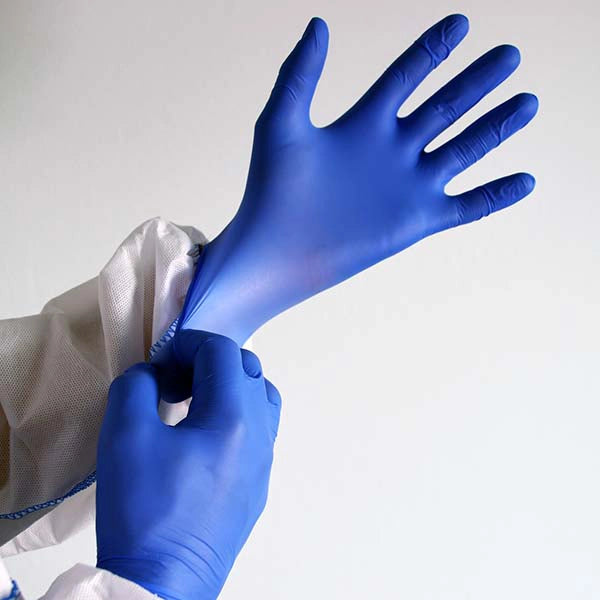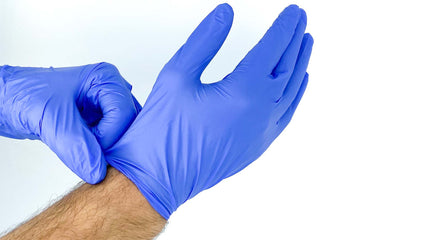If your line of work causes your hands to become dirty frequently, you may be wondering which practice is best - wearing gloves or just washing your hands.
This is a common inquiry in a day and age where hand hygiene is at the forefront of our minds. With that said, let’s look at a brief answer to this question before we dive into all the details:
Should I wear gloves or just wash my hands to keep them clean? In many situations, hand washing alone is not enough to keep the hands clean. For this reason, wearing gloves is recommended because they provide an extra layer of protection that can prevent dirt, bacteria, and harmful substances from reaching the hands in the first place.
Are Washed Hands Cleaner Than Gloves?
When it comes to hygiene and protection, the comparison between washed hands and gloves depends on the context and purpose. Both have their advantages and specific use cases, especially in environments where preventing the spread of germs and contaminants is crucial.
Washed Hands
Washing hands with soap and water is one of the most effective methods to remove dirt, bacteria, and viruses. Proper handwashing techniques, including scrubbing for at least 20 seconds and thoroughly rinsing, can significantly reduce the presence of pathogens. This method is essential for general hygiene and is recommended before and after eating, using the restroom, and after contact with potentially contaminated surfaces.
Gloves
Gloves, particularly disposable gloves, provide a physical barrier that helps protect against contaminants, chemicals, and infectious agents. In healthcare, food preparation, and certain industrial settings, gloves are essential for preventing cross-contamination and protecting both the wearer and others from harmful substances. Gloves are especially useful when there is a high risk of exposure to pathogens or hazardous materials that handwashing alone cannot mitigate.
Handwashing vs. Gloves Comparison
- Effectiveness: Washed hands can be very clean, but gloves provide an added layer of protection that handwashing alone cannot offer, especially in environments with high contamination risk.
- Convenience: Gloves can be more convenient in situations where frequent handwashing is impractical or when continuous protection is required.
- Limitations: Gloves can become contaminated themselves and must be used correctly, including proper donning and doffing techniques. They should be changed regularly and hands should still be washed before putting on and after removing gloves to ensure maximum hygiene.
- Skin Health: Frequent handwashing can lead to dry and irritated skin, while gloves can protect hands from such issues. However, prolonged use of gloves, especially latex, can cause allergic reactions or dermatitis in some individuals.
In conclusion, both washed hands and gloves have their roles in maintaining hygiene and safety. For optimal protection, it is often best to combine both practices: wash hands thoroughly and regularly, and use gloves when additional protection is necessary.
By understanding the benefits and limitations of each, you can ensure a higher standard of cleanliness and safety in various settings.
Wearing Gloves vs Hand Washing In Different Niches
There are many other careers or businesses that struggle with hand hygiene as well. This includes salon workers who use hair dye, plumbers, sanitation workers, farmers, and many others. This list may give you some indication of why it’s so important to find ways to keep the hands clean, and why professionals are looking into the question – should I wear gloves or just wash my hands?
For those who choose gloves, it’s important to keep in mind which type are best in keeping hands the cleanest and most protected. In all three examples below, nitrile-based hand protection is recommended for use for reasons that are explained within this article.
Car Washing Gloves vs. Handwashing
If you work in an auto repair shop, you’re all too familiar with how incredibly dirty the hands get after working on a car. Being the hands-on job that it is, and working with the substances that are required, makes it impossible for the hands to stay clean. The hands can easily get covered in oil, grease, transmission fluid, and the like. If your hands have ever been exposed to these items, you know they don’t come off very easily when you wash your hands.
So, is washing your hands enough if you work in the automotive repair industry? It’s clear that it’s not. To keep the hands clean, gloves must be worn. Not just any type though, they would need to be made of nitrile to provide full protection against dirt, hazardous car fluids, cuts, scrapes, and more. In addition to this, gloves made of this material offer the tactile sensitivity needed for handling car parts and picking up small items. They are also latex-free, so in an industry where the hands are basically covered all day, a latex allergy won’t develop, and those who are already allergic can work without the risk of getting a rash, or any other symptoms related to a latex allergy. We put together an article that may be of interest; it discusses why nitrile gloves are better than latex.
Food Prep Gloves vs. Handwashing
Food preparation professionals such as a restaurant chef, catering industry personnel, or a personal meal specialist, can get their hands dirty as they handle the food. This includes working with raw meats, vegetables that can easily stain their hands, such as beets or blueberries, messy items such as flour, as well as handling onions and garlic.
Working in an industry such as this on a daily basis makes it essential to have proper techniques for keeping the hands sanitary. So, in the case of gloves vs hand washing, it’s clear that covering the hands, and not just washing them is the right choice. On top of that, utilizing nitrile gloves, instead of latex or vinyl, should be a part of the food preparer’s strategy to keep their hands clean and protected. Nitrile is the best choice because of its great tactile sensitivity for easily handling food items, low friction resistance for frequent changing, 100% latex-free material, and the ability to conform to the hand for a perfect fit.
Food prep professionals should actually wash their hands also though; frequent hand washing is recommended in the food industry when handling food that can cause cross-contamination – it’s a best practice. But not wearing gloves and just washing the hands is not sufficient.
Cleaning Services Gloves vs. Handwashing
Cleaning specialists, whether for commercial or home services, should take care to prevent their hands from becoming dirty on the job. Unsanitary Kitchens that may be contaminated with salmonella or E. coli, dirty bathrooms (especially public restrooms), and the like, can wreak havoc on the hands. Even the act of wringing out a dirty sponge can fill the hand with all types of germs and bacteria.
First of all, would these cleaning professionals really want their hands exposed to all of the above elements, and then they just wash their hands once the job is completed? Probably not! This is when wearing gloves instead of just washing your hands is a must.
Cleaning professionals should also take note of the type of hand protection that is worn. When using as many chemical cleaners as they do - ammonia, bleach, detergents, and others, it’s essential to use nitrile since it's proven to hold up to chemicals much better than latex and vinyl. To see more information on this topic, you can read rough our comprehensive guide on nitrile vs latex gloves.
Conclusion
In conclusion, maintaining hand hygiene through the use of gloves versus handwashing depends largely on the specific context and industry requirements. While handwashing is effective for removing dirt, bacteria, and viruses, gloves provide an essential barrier in environments where hands are exposed to harsh chemicals, pathogens, or contaminants that handwashing alone cannot mitigate.
For professionals in various fields such as automotive repair, food preparation, and cleaning services, wearing gloves—particularly nitrile gloves—offers superior protection and convenience. Nitrile gloves provide excellent chemical resistance, durability, and tactile sensitivity, making them an ideal choice for tasks that demand high levels of hand protection.
For a wide selection of high-quality gloves suitable for various applications, visit gloves.com and save up to 50% on your order. Explore our collections today to find the perfect gloves for your needs!
Handwashing vs. Gloves: Frequently Asked Questions
Can wearing gloves be a substitute for hand cleaning?
No, wearing gloves is not a substitute for hand cleaning. While gloves provide a barrier against contaminants, they can still become contaminated themselves. It is essential to wash hands before putting on gloves and after removing them to ensure proper hygiene and reduce the risk of transferring germs and bacteria.
Is hand washing better than hand rubbing?
Hand washing is generally considered better than hand rubbing (using hand sanitizer) in most situations. Hand washing with soap and water effectively removes a wide range of pathogens, dirt, and chemicals. Hand sanitizers, especially those with at least 60% alcohol, are effective when soap and water are not available, but they may not eliminate all types of germs, such as norovirus and certain bacteria that cause diarrhea. Hand washing is preferred for visibly dirty or greasy hands.
Can wearing gloves be a substitute for hand cleaning?
As mentioned earlier, wearing gloves is not a substitute for hand cleaning. Gloves can provide temporary protection against contamination, but they must be used in conjunction with proper hand hygiene practices. Washing hands before and after using gloves is crucial to prevent the spread of germs and ensure overall hand hygiene.





